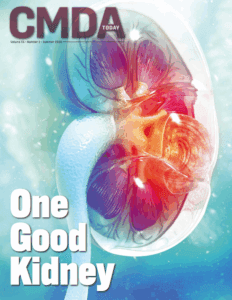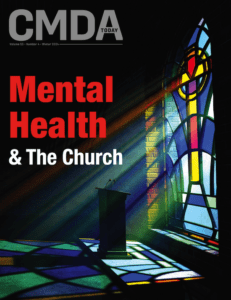Save and Support Lives with Abortion Pill Reversal
Rebecca had eight months to go before finishing nursing school and was in an unhealthy relationship when she found out she was pregnant. She had no car and little income, and she certainly did not feel ready to have a baby.
by Eric Hussar, MD
Rebecca had eight months to go before finishing nursing school and was in an unhealthy relationship when she found out she was pregnant. She had no car and little income, and she certainly did not feel ready to have a baby. Her first thought was that all she needed to do was take a pill and the rest would be history, with no one needing to know. It all seemed to be the right thing to do, until she actually took the mifepristone drug (RU-486) to abort the baby.
“I began to think about how this world is only for a short while, but my choice to abort this baby would be eternal,” she said. It was evident to her that she had made a mistake, but she did not know how to reverse this action. After an online search took her to the hotline from the Abortion Pill Reversal website, she confirmed with a nurse that reversal can happen, and this baby could be saved. She was connected to a physician, who compassionately met with her, answered her questions and was used by God to shine a light on the path Rebecca could take. She started the progesterone protocol, had healthy, routine prenatal visits and delivered a baby at eight pounds, one ounce with Apgar scores of eight and nine.
“He was gorgeous,” Rebecca remembered. “He takes my breath away every day.” After the birth of her baby, she went on to complete nursing school, and she also saw God provide for the needs and concerns that first flooded her mind upon becoming pregnant.[1]
Like me, you probably entered the healthcare field because you wanted to help people like Rebecca who were in significant need, who were facing challenges and for whom you could have a substantial positive impact. You may have gone in with the goal to save lives, like the life of Rebecca’s baby. In healthcare, we have the privilege of helping people at some of their most vulnerable points, while also being a shining light into their darkness. For many women, that moment arrives for them after they have taken mifepristone with the intention of ending their pregnancy.
Many pro-life advocates rightly rejoiced when the U.S. Supreme Court overturned Roe v. Wade in the Dobbs v. Jackson Women’s Health Organization decision in June 2022. No longer would abortion be seen as a guaranteed right in our Constitution. However, the issue is now sent back to the states. In the recent midterm elections, abortion measures were voted on in five different states, the outcomes favoring the pro-choice viewpoint in all five. In 2019, the most recent year with statistics from the U.S. Centers for Disease Control and Prevention, more than 600,000 U.S. women had an abortion[2], a slight increase from the year before. According to the Guttmacher Institute (a pro-choice organization), 54 percent of abortions in 2020 were done with mifepristone, the first time the majority of abortions occurred in this manner[3]. The number will likely continue to increase as some states will try to further restrict abortion access, and as many women can access these pills without ever seeing a healthcare professional in person or getting an ultrasound. Telehealth services to provide this have continued to abound.
While the pro-choice movement will tout that mifepristone is safer than acetaminophen (for the mother), numerous complications are possible and expected, including prolonged bleeding, pain, hemorrhage, nausea, weakness, vomiting, diarrhea and dizziness. At least 24 deaths have been reported, some due to an unusual clostridium infection, and others due to ruptured ectopic pregnancies that had not been evaluated by ultrasound.[4]
Clear evidence exists of the negative effects of abortion on mental health.[5] Women in the throes of discovering an unplanned pregnancy are frequently facing extremely difficult circumstances. They are often scared, thinking their future will be ruined or at least undesirably altered. They may be pressured by a partner or their parents to end the pregnancy, eventually turning toward taking a pill with the goal of emptying their uterus and letting things get back to “normal.” In the midst of this crisis, many of these women are turning to mifepristone to end the pregnancy. As could be expected, after having taken the pill, some women have second thoughts and wish they could reverse the decision they just made, just like Rebecca did. One of the websites they might land on is www.abortionpillreversal.com.
Mifepristone is a competitive antagonist at progesterone receptors, causing a separation of the decidua basalis from the trophoblast, and thereby being the primary cause of death for the fetus. Since mifepristone alone typically terminates the pregnancy only about 70 percent of the time, it is usually followed in one to two days by administration of misoprostol, to cause contraction of the uterus and dilation of the cervix. Since mifepristone is a competitive antagonist of progesterone receptors, it was postulated that giving large doses of progesterone could prevent the mifepristone from causing an abortion, with the understanding that the misoprostol is not given. In 1989, S. Yamabe demonstrated the effects of progesterone preventing the feticidal effects of mifepristone in rats.[6] Dr. George Delgado eventually founded the Abortion Pill Reversal program after a small initial study on six women, and later published a study on 754 women demonstrating a 64 to 68 percent success rate of his progesterone protocol for allowing women who had taken mifepristone to carry a healthy pregnancy to term. The rate of birth defects of these children was no different than the general population.[7]
Opponents of this treatment will argue that the progesterone protocol is not evidence based. The gold standard for evidence-based medicine is the randomized placebo-controlled trial. It is obvious to anyone that this kind of study could never be ethically done in this population. A woman wanting to save her at risk baby from the abortifacient effects of mifepristone could not be given a placebo pill in place of progesterone. The study done by Dr. Delgado demonstrated both the safety and efficacy of the progesterone when compared to general pregnancy statistics, or what would happen if no intervention was taken. Pro-choice advocates will cite a small study on abortion pill reversal that was stopped due to significant bleeding in three participants, but do not include the fact that the two bleeding cases requiring surgical intervention actually occurred in the placebo group.[8] It should also be noted that using progesterone in early pregnancy to prevent miscarriage in high-risk patients has long been a common practice. Since obstetricians have been trained to treat patients with this medication to help patients with a high risk for spontaneous abortion, it can be considered a reasonable therapy to help patients who started an elective abortion as well.
Pro-life proponents are frequently accused of saving the life of the baby but not caring about anything else, including the long-term outcomes for the parents involved or the child that is born. However, we must realize that the Abortion Pill Reversal protocol is only the first step in a long journey for mom, dad and others. Families can be referred to local crisis pregnancy centers, which have traditionally done an excellent job coming alongside of parents during this journey and have helped provide resources to further empower them as they nurture the child. A like-minded obstetrician should be utilized who can be supportive of the family and sensitive to the circumstances surrounding the pregnancy. Many parents will still have significant difficulties caring for a newborn baby or the childhood that is to follow. Adoption is an incredible opportunity both for the pregnant mother as well as for those who would ultimately parent the child.
Psalm 82:3 calls us to “…uphold the cause of the poor and oppressed.” The in-utero child is the most vulnerable, weakest member of our society. Helping others around us to see this child as a legitimate human being with equal value to those who have been born is paramount and part of fulfilling the call God has placed on His people. We will not win every legal battle trying to protect their rights, but it is our duty to lovingly engage those who are in darkness and to staunchly defend the rights of these most precious children. We also have tools at hand that can be actively used to save a life and save a mother and father from a lifetime of regret for a hasty decision.
Consider and pray about whether God is calling you to join or support the Abortion Pill Reversal network, so you could help these patients in their most vulnerable moments. And spread the word to others who could also become part of this team, such that we as Christian clinicians can be ready for the call.
Learn More
You can learn more about the Abortion Pill Reversal network and certification at www.abortionpillreversal.com. Also, more medical information about the Abortion Pill Reversal is available from the American Association of Pro-life Obstetricians and Gynecologists at www.aaplog.org. Plus, CMDA’s new Obstetrics and Gynecology Section seeks to educate, encourage and equip Christian practitioners in obstetrics, gynecology and women’s health by demonstrating the love and compassion of the Lord Jesus Christ. Learn more at www.cmda.org/specialtysections.
About the Author
Eric Hussar, MD, is a board-certified family medicine physician practicing in Marietta, Pennsylvania. He graduated from Temple University Lewis Katz School of Medicine in 2002 and completed a residency at Lancaster General Hospital. He has enjoyed caring for patients ranging from pre-birth to 100 years for more than 2 decades and is the Pennsylvania Director of the American Academy of Medical Ethics. He relishes outdoor activities and athletics with his wife and six children. God's grace and love have remained ever present through his journey.
[1] You can find Rebecca’s full story at https://abortionpillreversal.com/abortion-pill-reversal/success-stories/5-rebecca, along with those of many others.
[2] Centers for Disease Control and Prevention. (2019). Abortion Surveillance — United States, 2019 | MMWR - Centers for Disease Control and Prevention.
https://www.cdc.gov/mmwr/volumes/70/ss/ss7009a1.htm
[3] Guttmacher Institute. (2022). Medication Abortion Now Accounts for More Than Half of All US Abortions. https://www.guttmacher.org/article/2022/02/medication-abortion-now-accounts-more-half-all-us-abortions
[4] AAPLOG. Medical Management of Elective Induced Abortion. (2020). https://aaplog.org/wp-content/uploads/2020/03/FINAL-PB-8-Medical-Management-of-Elective-Induced-Abortion.pdf
[5] Pubmed. The abortion and mental health controversy: A comprehensive literature review of common ground agreements, disagreements, actionable recommendations, and research opportunities. (2018). https://pubmed.ncbi.nlm.nih.gov/30397472/
[6] Pubmed. The effect of RU486 and progesterone on luteal function during pregnancy. (1989). https://pubmed.ncbi.nlm.nih.gov/2776921/
[7] Issues In Law and Medicine. A Case Series Detailing the Successful Reversal of the Effects of Mifepristone Using Progesterone. (2018).
[8] Medscape. Abortion Reversal Study Stopped Early for Severe Bleeding. (2019). https://www.medscape.com/viewarticle/922564?icd=ssl_login_success_221117



